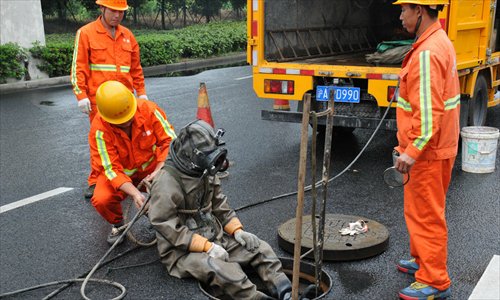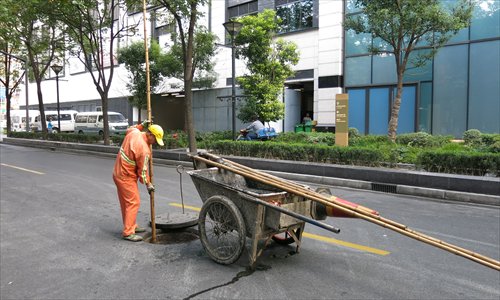HOME >> CHINA, METRO SHANGHAI
The worst job in the world
By Du Qiongfang Source:Global Times Published: 2014-11-3 18:18:01
Shanghai’s sewer divers keep the city looking clean

One of Shanghai's sewer divers prepares for work underground. Photo: Courtesy of Shanghai Municipal Drainage Management Office
From the ground up Shanghai is a city of glamour, of glass and neon and dazzling beauty. Below the surface, however, in the intestines of the city, there is no beauty, just darkness and muck.
If the city's intestines get blocked, if the sewage system is obstructed by something, the city will see its pleasant streets awash with dirty stinking sewage.
Keeping Shanghai clean in this way is a team of professionally dedicated sewer divers who may well have one of the worst jobs in the world. They work in the dark, in water, excrement, dead animals and cigarette butts. The air down there is poisonous and they survive through breathing apparatus connected to air pumps on the surface. They keep the city looking good.
Pumping stations throughout the city move the industrial and domestic sewage from households, factories, businesses, hotels and restaurants to sewage treatment plants, and move rainwater to rivers.
At present there are about 19,424 kilometers of sewer pipes and rainwater pipes in Shanghai. At the end of 2013 there were 1,041 pumping stations keeping the drainage system moving. If there are blockages anywhere the sewer divers are called in to remove the problem.
Vital for the city
Fang Chenyang is the secretary of the Party committee of the Shanghai Municipal Drainage Management Office under the Shanghai Water Authority and explained: "In order that the pumps can draw water, we have to make sure that the sewage system is clear. We have high-pressure flushing equipment and sewage suction vehicles that can dredge the channels but they are not always effective. If they don't work the divers are needed. It is a difficult and dangerous job but it is vital for the city."
This sort of diving is a high-risk venture and totally unlike diving in the ocean or in lakes or rivers. Working underground and in the dark sewer divers have to locate the source of a blockage, remove it and ensure the system can be resealed and put back to work.
In Shanghai, there are some 130 professional sewer divers. One of them is 38-year-old Qian Yunfeng from Jiangsu Province and he has been working as a sewer diver in Shanghai for 10 years.
"When I first went down into a sewer, I was so frightened I could only stay in the water for 10 minutes. I was so nervous that I didn't smell anything then. My mind was blank. It was pitch-black and I was too frightened to take my hands off the ladder even though I was only 3 meters under the surface which isn't deep for a diver. I stood there experiencing this feeling and climbed back up quickly. Older workers congratulated me and assured me I was safe and that they were looking out for me," Qian said.
Removing blockages
The divers don't work just when there is flooding during the storm season. They have a full roster of work to carry out the year round. Whenever pools of water gather on roads or in residential compounds and they cannot be drained normally the divers have to go underground to locate and remove the blockages.
Sewer divers usually work in teams with a leader, a diver and two support workers. When they reach the scene of the blockage they first set road cones up to divert traffic and then lift off the manhole covers to let any accumulated poisonous gases escape. When it is safe to enter the diver first checks the water levels in that section of the sewer and compares it with the neighboring sections.
Then he is helped into his wet suit by the support workers. Depending on the task in hand divers can wear a light wet suit which weighs about 5 kilograms or a heavy suit which can weigh up to 30 kilograms. If the sewer channels where they are working are deeper than 10 meters divers wear the heavy suit and carry 15-kilogram lead weights to add stability.
Before actually entering the sewer the diver and his team will check that the air supply is functioning properly.
Then the diver climbs down a ladder to get to the sewer channels which are usually at least 3 meters underground, some can be 10 meters below. Some of the channels are huge with ceilings that reach 20 meters high. Then there are other pipes for access that are just 30 centimeters wide - divers have to crawl slowly through these and there is no way of turning back.
When the diver discovers the blockage he breaks it up with a high-pressure water pump gun, putting the pieces into a bucket which is pulled out by the other members of the team. This can take time if the blockage is large or solid.
In complete darkness and breathing only through the air hose connected to the pump above him, a diver will work for up to two hours with one or two short breaks. He will not spend more than 40 minutes underground at a time - longer than this and a diver can begin suffering and feeling uncomfortable. Divers have to survive in the poisonous atmosphere of the sewer pipes where the hydrogen sulphide and other gases created by the waste can prove lethal if absorbed over a period.
There are other dangers. Being washed away by a sudden intake of water or sewage is a constant threat as is drowning or getting stuck in a small drain.

A worker cleans a sewer from a road outlet in Shanghai. Photo: Du Qiongfang/GT
Safety ropes
On one occasion Qian was working on a blockage but when he cleared it successfully a rush of water and waste started to drag him along the channel. Fortunately he had had a premonition that this might happen and tugged on the safety rope that linked him to the team above. All divers have a safety rope connecting them to the surface. They can give a series of tugs that signal whether the diver is safe or needs help.
Qian had realized there could be problems on this operation and told his team to be particularly alert. So when he sent the signal that he was in trouble the others began pulling him to safety.
Most blockages the divers find are caused by stones, mud or construction materials. Sometimes they find toys or dead animals. The sewage pipes always carry more rubbish than the rainwater pipes - sometimes during maintenance work two truckloads of garbage can be pulled out of one section of a sewage channel at a time. Then occasionally in the rainwater drains which can run into rivers, divers will see fish swimming, which is a delight for them in their work.
Although this summer was one of the driest summers in Shanghai's history and there were fewer storms, the sewer divers were as busy as ever.
"We have to maintain the drainage system to prevent potential blockages caused by storms. Most of the time we are carrying out maintenance work so that residents don't get to complain about flooding on roads caused by blockages," Qian said.
The teams have been busy. Between January and September this year, 11,243 kilometers of sewage pipes were dredged around Shanghai. Some 1.43 million manholes and water inlets were maintained and cleaned and 127,500 cubic meters of mud were removed to make sure rainwater could drain quickly and not flood on the roadways.
"When all the pumping stations around Shanghai are operating the city can discharge 3,000 cubic meters per second," revealed Fang Chenyang.
"Today, people are much more aware of the environment. Water is a basis for our environment and the drains and sewerage system are essential to keep our water environment clean and healthy," Fang said.
Qian's company, the Shanghai Min Jie Engineering Construction Co, employs 10 sewer divers and they have an average age of 35. All have been divers for at least 10 years.
Swimmers not needed
Wang Dahua is the general manager of the Shanghai Min Jie Engineering Construction Co and explained that though they are divers, sewer dives don't actually need to be able to swim.
"They must be in excellent health though. Divers can't have high blood pressure or heart problems. They go through a physical examination every year to renew their licenses. It is more important that they are intelligent, flexible and ready to respond quickly in emergencies.
"When they are in the water, they cannot see anything. They have to act the way they feel they should and it's about the way they remember things and the way they assess situations. It takes at least six months to train a diver," he told the Global Times.
They are hardly ever seen in the city although they go to work every day. They usually work outside of rush hours and sometimes work at night.
"The work is hard. It's freezing cold in winter and hot in summer. We hope the public gets to understand what we do and appreciates our work when they see us on the roadways," Wang said.
Posted in: Society, Metro Shanghai, City Panorama